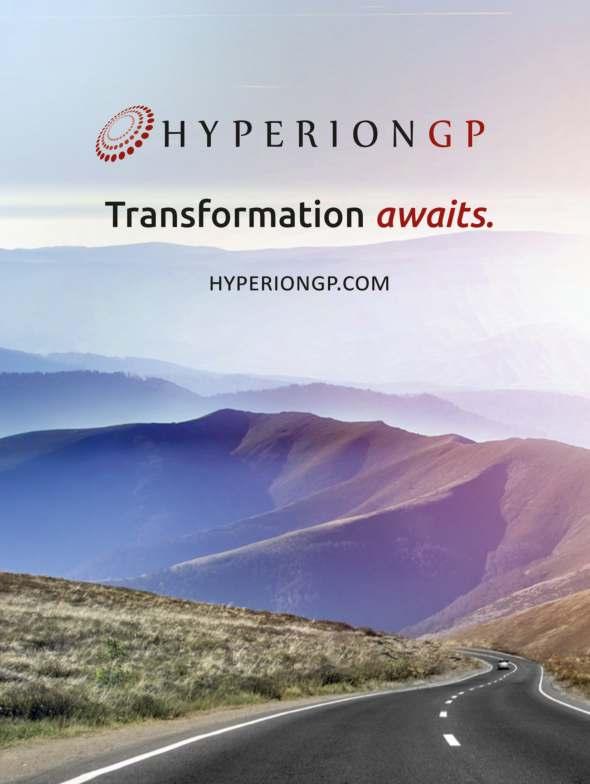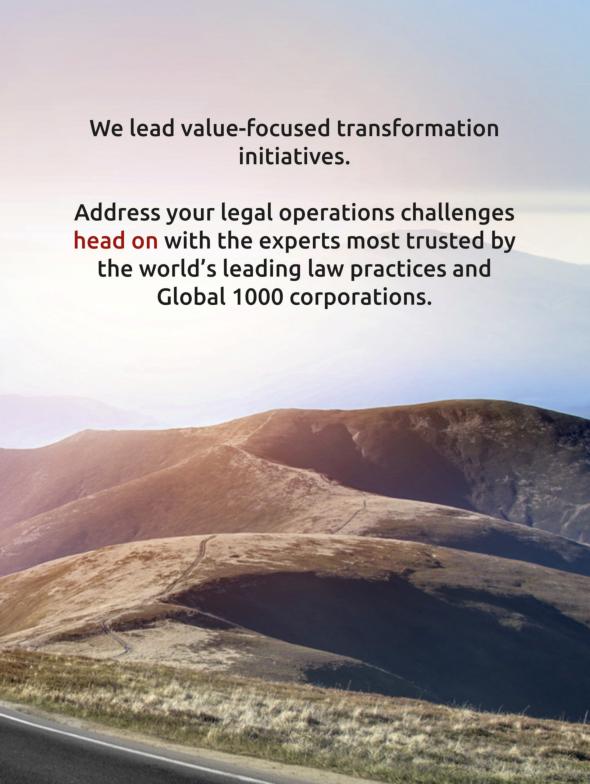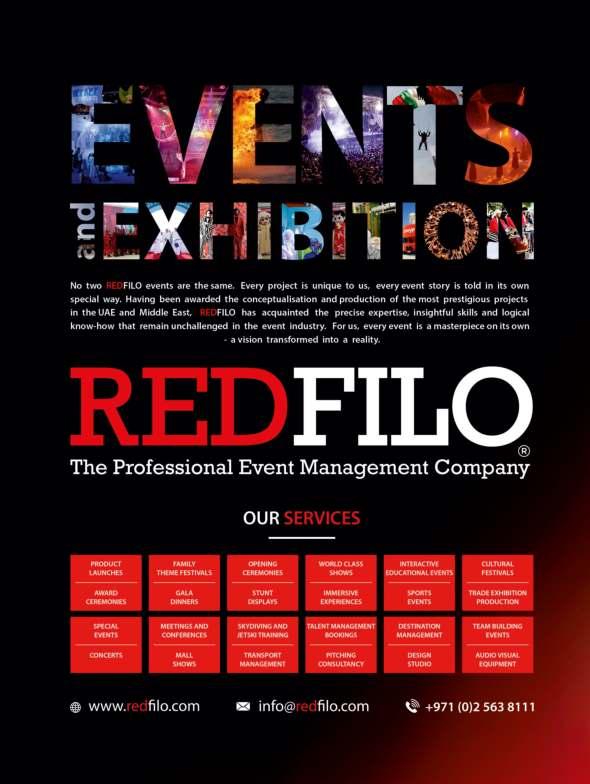






















Leadership skills are pivotal in today's high-tech industry.
Whether you run your own business, lead a whole department, manage a small team, or aim to get a promotion, being a good leader will help you thrive. Rapid change, rising market opportunities, and new customer needs –all the time– are the only constants in the tech industry. This means that for your organization to remain what it is now, you need to adapt constantly. You need to think of new ways to do things quickly.
You are not just trying to figure out the world that surrounds you but also attempting to determine who you are and what your role truly is within your organization. The digital world and its constant changes actively challenge your perspective and sense of self, but don't let these dynamics affect you. Of course, this ecosystem demands continuous adaptation, but good leaders are genuine and true to their beliefs. Even in challenging situations.
Clear communication is a non-negotiable skill for being a good leader, especially in the tech world. At some point, you will need to explain technical messages to non-technical people, transfer complex ideas from one team member to another, or simplify an intricate vision to your whole team. When you need to do so, clear and concise communication will be your best ally.
Effective communication is not only about transmitting information but also about inspiring and coaching others. It is about being able to listen to, and communicate with, a wide range of people across roles, geographies, social identities, and more. Some cultures, for example, expect explicit, specific messages, while others tend to rely on the context between the lines.


Working in the high-tech industry requires quite unique leadership skills. Embracing the journey of the influential personalities who are transforming the modern business arena with their exceptional traits and innovative ideas, CIOLook features the enthralling stories of such staunch leaders in its latest edition, " The 30 Most Influential Business Leaders in Tech, 2022 .”
Flip through the pages and have a delightful read !
Joshi Abh ish e k J o sh i Abhishek
Abhishek

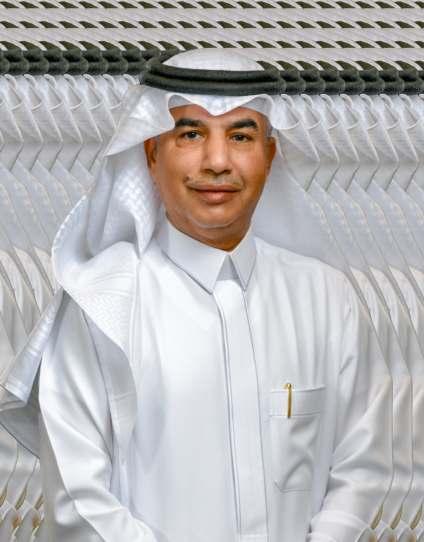




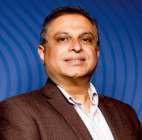



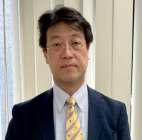

FOLLOW US ON www.facebook.com/ciolook www.twitter.com/ciolook
WE ARE ALSO AVAILABLE ON
CONTACT US ON
Email info@ciolook.com For Subscription www.ciolook.com
Copyright © 2022 CIOLOOK, All rights reserved. The content and images used in this magazine should not be reproduced or transmitted in any form or by any means, electronic, mechanical, photocopying, recording or otherwise, without prior permission from CIOLOOK. Reprint rights remain solely with CIOLOOK.
Carey Smith CIO
QuEST Global quest-global.com
Aglaia Capital aglaiacapital.com
Orchid Insurance orchidinsurance.com
Quest Global brings deep industry knowledge and digital expertise to deliver E2E global product engineering services.
Aglaia Capital is an independent Corporate Finance advisory firm matching asset-backed, transactions with investors and financing providers.
Orchid Insurance is among the largest specialty underwriters of catastrophe-exposed property insurance in the United States.
Cindy Hoots CIO Daniel Hofmann CEOAstraZencca astrazeneca.com
Hornsecurity hornetsecurity.com
David Reid CTODanis Cahill CTO
AstraZeneca is a global, science-led biopharmaceutical business and our innovative medicines are used by millions of patients worldwide.
Hornetsecurity is the only Email Filtering Service that has over 250 five-star reviews on Spiceworks.
NOV provides oilfield equipment, technologies, and expertise that answer the challenges of oil and gas customers worldwide. NOV nov.com
Wolters Kulwer wolterskluwer.com
Wolters Kluwer is a global provider of professional information, software solutions, and services for clinicians, nurses, accountants, lawyers.
AlHumam, Senior Vice President of Corporate ServicesEmad
International Maritime Industries imi-ksa.com
Evelyn Miralles Business AssociateAegis Aerospace Inc aegisaero.com
Hiren Kotak CEOHyper-Botz hyper-botz.com
International Maritime Industries is the largest integrated, fullservice maritime yard in MENA offering competitive, safe, high-quality, and on-time solutions to ship and rig customers around the globe.
Aegis Aerospace offers 30 years of success and innovation in the areas of commercial space services, technology and engineering services, and related products.
Hyper-automation aka Intelligent Process Automation (IPA) positions your organization for speed, efficiency and growth.
CTIO CTO
Kris Rao CIO and CTO
HNI Corporation hnicorp.com
Larry Cates CEOLily Ley
VP &Global Learning Systems globallearningsystems.com
CIO
Loris Degioanni CTO Naeem Farooqi FounderPat Jerding
SVP &PACCAR paccar.com
HNI is a leading provider of workplace furnishings.
Global Learning Systems applies our 30 years of experience in designing and delivering security awareness training programs for our customers to craft a tailored solution designed to meet your needs as an organization.
PACCAR is a global leader in the design, manufacture and customer support of high-quality premium trucks.
Sysdig is driving the standard for cloud and container security. Sysdig sysdig.com
FleetZero fleetzero.com
CIO
Rahul Bhardwaj Global Privacy and Data Security Rocco Pellegrinelle Founder & CEOUnivar Solutions univarsolutions.com
Fleetzero is building a fleet of electric ships to deliver cargo for its customers without a green premium.
Univar Solutions is a global partner to our customers and suppliers for the value-added distribution of chemistry and related products and services.
Kroll kroll.com
Trendeting trendrating.com
As the leading independent provider of risk and financial advisory solutions, Kroll leverages its unique insights, data, and technology to help clients stay ahead of complex demands.
Trendrating is a global leader in the field of advanced analytics and portfolio management technology serving thousands of asset owners worldwide
Susumu Matsuda Director, IT Division
Sandy Repp CIO
Shamim Mohammad CIO
Simon Bonk Chief Research Officer and Director of Business Development
Steve
Santoku Corporation Co., Ltd santoku-corp.co
TravelCenters of America ta-petro.com
Santoku Corporation is a company that contributes to society by creating safety-enhancing methods and safety ideas.
TravelCenters of America Inc. operates, or franchises, travel centers, standalone truck service facilities and a standalone restaurant.
CarMax revolutionized the auto industry by delivering the honest, transparent and high-integrity car buying experience customers want and deserve. Carmax carmax.com
Telio tel.io
McGovern CEOSteve Palmucci Global CIO
Telio adheres to the highest security standards, simplifies work processes significantly and has a rehabilitating effect.
Dubber is the world's leading provider of cloud-based call recording and voice AI. Dubber dubber.net
Covetrus® is a global animal-health company dedicated to empowering veterinary practices. Covetrus covetrus.com
Victoria
Pelletier Founding DirectorTim Conroy Decision Analyist
Olive Ltd - oliveltd.com
Olive is an open banking, payments-driven technology for businesses wanting to help customers reach financial goals by generating new deposits and donations inside of your existing customer experiences.
Experian is a leading global information services company, providing data and analytical tools to our clients around the world. Experian experian.in
Tim Hardcastle CEO & Co-founder
INSTANDA instanda.com
Zea Schindler Director
doeLEGAL doelegal.com
The INSTANDA platform enables carriers and MGAs to create, build and implement complex insurance products in a matter of weeks or months.
doeLEGAL is an expert leader and top provider of Enterprise Legal Management solutions & eDiscovery services that increase efficiency and lower costs.
Emad AlHumam Senior Vice President of Corporate Services International Maritime Industries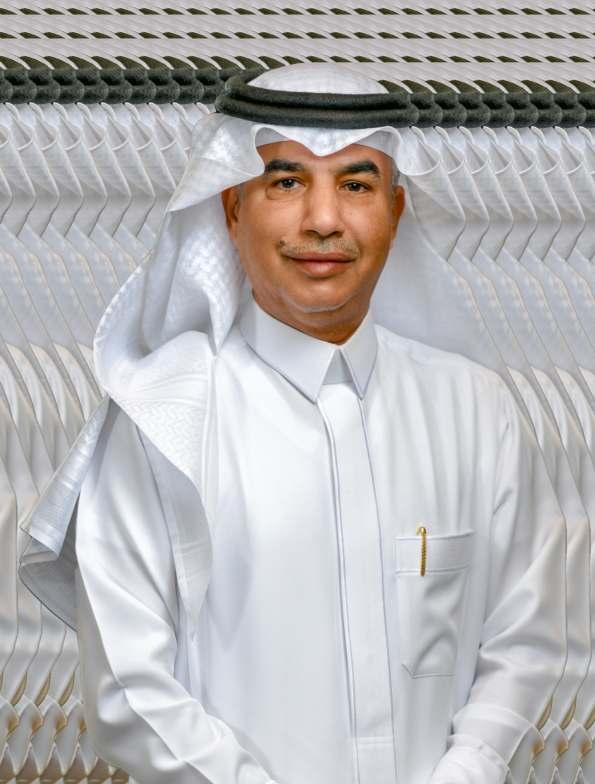







IMI is a pillar of Saudi Arabia's vision to build a thriving economy with a technologically advanced and sustainable maritime sector, setting new technological standards in the regional maritime industry.
The workforce of any organization perceives the mission and vision set by the corporation through the eyes of the leader directing and guiding them. Because it is the leader who decides the factor that contributes to the success and development of the company and the values the organization would be heading forward with.
A leader carves the path for their subordinates to ensure that they do not find themselves being lost while utilizing their strengths and strategies. This ensures that the organization meets growth while also incorporating employee satisfaction.
Emad AlHumam is one such visionary executive with extensive experience that stems from his multi-faceted exposure that spans multiple disciplines. Disciplines in project management, IT, oil & gas, strategic planning, and recently, the Maritime industry. His current senior executive role as Senior VP of Corporate Services at International Maritime Industries allows him to utilize his strategic thinking and expansive skills and strengths gained from his past CIO leadership roles or his impressive knowledge in Cybersecurity or his past CFO role.
In an interview with CIOLook , Emad highlighted the leadership qualities that set him apart from others while also disclosing the story of his journey in the industry of Technology.
Below are the highlights of the interview:
Brief our audience about your journey as a business leader until your current position at International Maritime Industries. What challenges have you had to overcome to reach where you are today?
My journey began at Saudi Aramco in Dhahran, Saudi Arabia, in 1990, after graduating from King Fahd University of Petroleum & Minerals with a B.S. degree in Systems Engineering. I later obtained an MBA from the University of Phoenix School of Management in 2009 and completed the CIO MBA Executive Program at Boston University.
From 2007 to 2009, I was the Chief Information Security Officer (CISO) at Aramco Services Company (Aramco Americas) in Houston, Texas.


My current role as Senior VP of Corporate Services at International Maritime Industries (IMI) has served as
an ideal opportunity for me to utilize my strategic thinking and expertise in Project Management, Information Technology, and Cybersecurity within the oil and gas and maritime industries.
Before my current role, I served as Senior Vice President of Operation Services and completed an assignment as Vice President of Procurement & Supply Chain Management in August 2020. I have also held similar leadership positions as Chief Financial Officer and Vice President of Information Technology.
Before joining IMI in December 2017 as Vice President of Information Technology, I held several leadership roles throughout the last 20 years that span multiple disciplines, including Project Management, Information Technology, Cybersecurity, and Strategic & Business Planning in the Oil & Gas industry.
Throughout my 32-year-long career, I have faced many challenges, which I later realized were important experiences that allowed me to develop both personally and professionally. For example, I was in charge of leading a team to urgently embed traffic light systems during the global Y2K challenge and was able to successfully implement all the required changes in a short amount of time, saving the company's digital infrastructure. Another example is when I successfully led a capital technology project worth around USD 135 million with an approved budget of only USD 82 million, delivering the full scope of the project despite the budget constraint.
Tell us more about International Maritime Industries; what are its mission and vision?
IMI is the largest maritime yard in the MENA region with global ambitions and reaches, offering innovative solutions that will contribute to the development of the Saudi maritime industry.
Our Vision is to be a leading provider of maritime products and services to the world. As an integrated maritime products and services hub, we are building strategic relationships with industry-leading companies to deliver a range of innovative services to our customers.
Our efforts are helping to develop the nascent maritime industry in Saudi Arabia and establish the Kingdom as an advanced regional logistics hub that
promotes economic diversification in line with the goals of Vision 2030. IMI will support Saudi Arabia's economic growth through job creation and talent localization.
Enlighten us on how you have impacted the tech industry through your expertise in the market.


IMI was well-placed to respond to the challenges of COVID-19 due to our strong business fundamentals and digital infrastructure. These factors provided a solid foundation for the growth and continuity of our business and enabled us to effectively weather the impacts of the pandemic.
Throughout the pandemic, IMI's business activity saw minimal disruption, and we continued to provide highquality products and services to our customers. In a way, the pandemic has contributed to being a critical
enabler of IMI's development and expansion strategy, especially as the company is progressing along its rapid growth trajectory.
We have maintained our operations and enabled as many people as possible to work remotely and in safe environments. Through our innovative solutions and state-of-the-art technologies, IMI was able to drive forward the establishment of IT and Cybersecurity platforms to ensure minimal disruption to our business. It has become clear that the impact of the pandemic has helped speed up the implementation of our digital systems and communication platforms.
During the pandemic, I led the IT and Cybersecurity teams. Within 72 hours of the Saudi government's announcement of lockdown rules and restrictions, my team and I had made remote operations a reality for the entire company by enabling all IMI users to work from
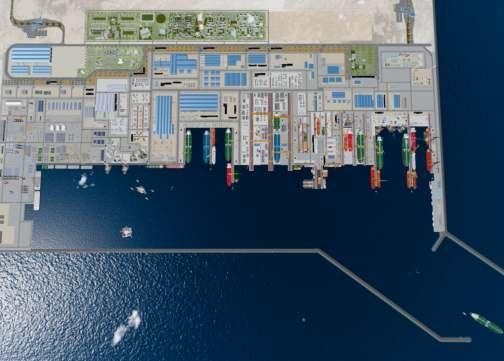
home, distributing laptops, providing remote access, deploying Skype for Business and Microsoft Teams for virtual meetings, activating platforms for online tasks and to-do list tracking, installing video conferencing tools for all meeting rooms in IMI offices, and activating our 24/7 IT support team.
Describe in detail the values and the work culture that drives IMI.
IMI engages with its internal stakeholders in cultivating its corporate culture, which is guided by our five core values of Safety, Customer Focus, Integrity, Innovation, and Accountability – all of which underpin our business decisions, actions, and behaviors.
We aim to build a skilled workforce that will contribute to long-term business success while supporting the Kingdom's economic development. The company actively supports the growth and knowledge of its employees through training programs that help to propel their development at IMI and throughout their careers.
Furthermore, empowering Saudi youth and employing women are among our key priorities. The company is expected to contribute to creating around 80,000 direct and indirect jobs with a Saudization rate of more than 50% and currently employs several women in areas such as engineering, safety, business development, finance, and information technology.
Our core company values have been and will continue to keep us anchored as we grow and progress as a business.

Technology is playing a significant role in almost every sector. How are you leveraging technological advancements to make your solutions resourceful?
Advanced technology is the main driver in IMI's development as a maritime leader and disruptor. We provide quality, reliable, and efficient solutions powered by the latest technologies at competitive prices to attract customers to IMI and Saudi Arabia. Our unique offerings are enabled by our Digitalization Strategy, which has become a distinguishing factor in the maritime industry, supporting our profitability and sustainability as a business.

The strategy consists of several different elements. Firstly, establishing a new business model that revolves around cost competitiveness, innovation, and longterm partnerships. Secondly, investing in big data analytics and digital twin automation to support the development of our yard and products and provide product lifecycle management services. To ensure that our information technology infrastructure is robust and resilient, we are aiming to build on our cybersecurity framework to meet national and international standards and align with global industry best practices.
We continuously invest in digitalization and currently have more than initiatives across our business that will


further establish IMI as one of the most advanced maritime facilities in the world. An example of this is our utilization of software-based labor to optimize operational efficiency by eliminating repetitive tasks that consume our employees' time.
We also use augmented, virtual, and mixed-reality applications for workforce enablement and training, as well as mobile applications that provide yard workers with access to the information, they need to perform their daily tasks efficiently.
RFID and biometrics are used for workforce tracking and safety monitoring within our yard, while big data analytics optimize our processes and contribute to cost-effectiveness. We also have ongoing projects with tech leaders like AVEVA to develop an integrated data management platform and Nutanix, a leader in a private cloud, hybrid, and multi-cloud computing.
What change would you like to bring to the tech industry if given a chance?
I see a clear opportunity for IMI to lead the industry forward to new heights. By embedding advanced technologies, including AI, biometrics, the Industrial Internet of Things (IIoT), digital twin automation, digital workers, and product remote monitoring, IMI will offer a cutting-edge advantage in this era of digitalization.

IMI is a pillar of KSA's vision to build a thriving economy with a technologically advanced and sustainable maritime sector, setting new technological standards in the regional maritime industry.
What, according to you, could be the next significant change in the tech sector? How is IMI preparing to be a part of that change?
Today, the global maritime industry is exploring and implementing new technologies that aim to optimize operations and make them more efficient. Technologies like robotics, AR, machine learning, and drones are being harnessed to create safer and more productive environments; and improve operations, supply chains, and life cycle partnerships.
With a new and modern shipyard that is built on a foundation of the latest smart technologies and infrastructure, like robotics for automatic plate cutting, nesting, pipe spool fabrication, welding, inspections, and more, IMI is already part of that change.
Where do you envision yourself to be in the long run, and what are your future goals for IMI?
Saudi Arabia is playing a prominent role in shaping the future of the global maritime industry, and I am proud to be contributing to this. The local maritime industry is working to establish the Kingdom as a regional logistics hub and promote economic diversification and job opportunities. IMI intends to build more than just the biggest shipyard in the MENA region but also the most innovative and digitalized.
What would be your advice to budding entrepreneurs who aspire to venture into the tech sector?
I would advise entrepreneurs entering the tech industry to prioritize networking with potential clients, industry experts, investors, and suppliers, even in the initial stage of ideation, as that would help to identify and define their business objectives early on.
Entrepreneurs need to seek as much information as possible and determine what opportunities will serve the growth and development of their businesses. They must also identify means to generate valuable feedback and build a team of unique, educated professionals with a diversity of interpersonal skills and expertise. Lastly, setting both short- and long-term achievable goals will help to maintain growth momentum and keep their teams motivated.
What is IMI's long-term objective one it comes to building a smart ship or smart product in general?
IMI aims to maximize its customers' investment in newbuild vessels by delivering smart ships. At a fundamental level, this involves monitoring and controlling key equipment on the ship and subsequently using the power of the cloud and Artificial Intelligence to provide operational insights in a digital twin visualization of the vessel. For example, using the huge volumes of operational data that IMI can collect to build better system-wide predictive maintenance for standard ship designs.




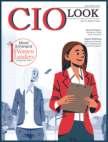
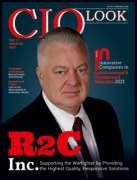
In the ever-evolving modern industry, almost every company and organization requires a transformative vision to strive toward gaining exponential progress in the business arena.
A transformative vision provides an edge to enhance organizational operations along with administration, resulting in the continual of pushing the organization towards scaling its success. Hence, the vision needs to be in sync with the integrated knowledge of not only industry norms but also virtues gained through extensive first-hand problem-solving opportunities.
Evelyn Miralles, Business Associate for Aegis Aerospace Inc , is the perfect embodiment of a staunch transformative leader whose vision notably apprehends the insights for technology foresight, bifurcating her association from the rest.

With over 30 years of extensive experience in roles, as an executive leader and a pioneer in computer technologies, Evelyn has a successful record of creating partnerships and generating initiatives that lead to innovative solutions and services, benefiting the growing diverse and digitally connected world.
In her current position as a consultant, she is providing her expertise in building internal teams, competitive products and services, considering new market trends and requirements, and including technology foresight and coaching.
We at CIO Look got an opportunity to interview Evelyn in which she shared insights into her journey in the Aerospace Industry as well as her transition into a business leader.
Below are the highlights of the interview:
Brief our audience about your journey as a business leader until your current position. What challenges have you had to overcome to reach where you are today?
My professional journey began in 1992, when I was selected to be part of a small team of engineers at NASA Jonson Space Centre in Houston, Texas, with the mission to develop a new immersive system to help train astronauts to perform space operations in microgravity. Those years were very challenging, with critical deadlines and setbacks, working long hours all while raising a family.
In my consultation, the biggest driver is efficiency, innovation, transparency, collaboration, and finding solutions that make sense to the clients, all while aiming to produce costefficient outcomes.

After retiring from NASA as Chief Engineer in 2019 and leaving 27 years of incredible work successes, I accepted a position working in higher education as the Associate Vice President for Strategic Information Initiatives at the University of Houston Clear Lake. Working in academia was a great opportunity to expand my leadership and strategic knowledge launching my next position in 2022 as a senior business consultant, serving for Aegis Aerospace and performing private consultations in the areas of technology, innovation, and workforce development.
During my journey, one of the biggest challenges was to advance professionally in an all-male-dominated environment. But having focus, granting time, expanding my education and personal determination, allowed me to reach most of the goals.
Tell us something more about your company and its mission and vision.
I am working as a consultant with the vision and mission to provide business strategic development for industries, not exclusive to aerospace, in the areas of technology, innovation, modeling, simulation analysis and training. I am also currently a business consultant for Aegis Aerospace, whose mission is to provide commercial, turn-key space services, spaceflight product development, and engineering services for the civil and commercial space and defense industries.
Enlighten us on how you have impacted the aerospace industry through your expertise in the market.
The biggest impact on the aerospace industry has been to work developing immersive solutions, products and services, with the goal to improve training efficiency. By doing so, I was able to help develop the first ever stateof-the-art 'virtual reality VR ready system' for space flight training - use to the date - which provides the capability of preparing astronauts for microgravity activities.
This was a significant improvement in simulation and training generated by NASA under multiple commercial contracts, advancing productivity, lowering costs, training time, and consistency within the organization, all in support of human space flight operations and maintenance.
That opportunity led me to help pioneer VR immersive technologies utilized for spatial awareness, spacewalks and robotics activities, which have been critical to supporting the Space Shuttle program and the construction of the International Space Station (ISS), as well as the development of the Commercial and Artemis programs.
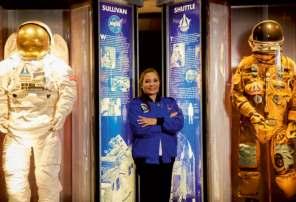
Describe in detail the values and the work culture that drives your organization.
I will speak on my consultation, where the biggest driver will be implementing efficient processes, innovation, transparency, collaboration, and finding solutions that make sense to the clients, all while aiming to generate cost-efficient outcomes. Knowing and understanding how to prototype and built things for testing and applying agile engineering. All these are cultural drives that I utilize in my business practice.
Undeniably, technology is playing a significant role in almost every sector. How are you leveraging technological advancements to make your solutions resourceful?
Unthoughtfully, new technology tools and digitalization of processes are helping to generate better solutions and improving manufacturing, particularly in the aerospace sector, reducing time and costs, and enhancing participation with local and remote team members. These new applications are redefining how we collaborate, impacting the final products and services we generate.
What change would you like to bring to the aerospace industry if given a chance?
Since aerospace is a risky business that takes time and money, we need to be better prepared for what is coming next, understanding the need of tomorrow to build the workforce necessary for the future, while supporting the exponential increase of digitalization in the industry, reason why bringing a knowledgeable foresight outlook on what is coming next is so relevant and important, technically speaking.
I decided to endeavour in academia precisely because I wanted to understand what was happening in that arena and help to articulate what the future will be like. We need more opportunities for younger engineers with the support of solid mentors that can help nurture the next generation. Without that, we won't have a solid ground to build from.
What, according to you, could be the next significant change in the aerospace sector? How is your organization preparing to be a part of that change?
I think one of the biggest and most exciting changes is the inclusion of new digital innovations pushing the industry to utilize more automation, artificial intelligence (AI) and robotics for manufacturing and operations purposes.
Also, with the expansion of the Internet of Things, a lot of new tools and applications are beginning to be available for the sector. We will prepare best by having access to early versions or prototypes of the tools, software or hardware, and become part of the early testing teams, as we built successful solutions.
Where do you envision yourself to be in the long run, and what are your future goals for your business?
I always envisioned being at a place where I can look back and say 'mission accomplished' and where I can communicate what is happening. It is an extremely rewarding feeling to see that the 'seed of knowledge' I planted is growing, producing fruits - metaphorically speaking. I have many goals for my business, the most important is to continue to spread my expertise and educate, helping many others to be better adapted for a productive and fast digital future.
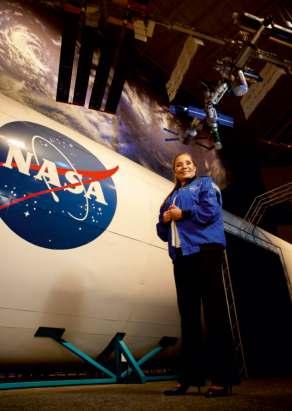
To study, work hard and define what area in aerospace they feel most comfortable and academically capable of performing. As much as we can read about something, we should be able 'to do' and build. So, I will recommend getting your hands on assembling 'something' and going through the process to see a result or outcome.
This will strengthen and expand your analytical skills. Also, very equally important, will be to discuss opportunities with other people in the space and learn what they do, how and why. This will give you a realistic understanding about the struggles and complexity of the available jobs, and the needs that others may have.
Automation is the name of the game. It lowers costs, increases productivity, automates all repetitive tasks, and frees up human capital for tasks that require more creative thinking and innovation. Businesses are intrigued and clamoring for the latest tech to gain an advantage over their competitors.

Providing the best inventory in the market is Hyper-Botz with technologies that can enable organizations to ‘hire’ a digital worker that performs faster, better, and cheaper.
Hiren Kotak, its CEO, is an RPA (Robotic Process Automation) enthusiast. He envisions a world where humans can work like humans instead of doing robotic
work. Highly result-driven and a creative problem solver, Hiren designs large-scale solutions to deliver significant business value – transforming businesses and customer experiences.
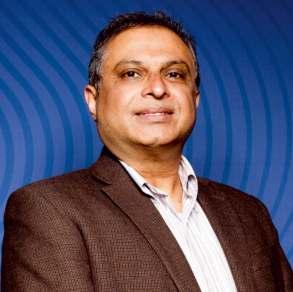
On the hunt for tech leaders who are changing the game, Insights Success came across Hiren Kotak. We interviewed him about what drew him to the automation industry, his goals for Hyper-Botz, and his views on the tech industry’s future.
Below are the highlights of the interview:
Brief our audience about your journey as a business leader until your current position at Hyper-Botz. What challenges have you had to overcome to reach where you are today?
About seven years ago, as a result of my passion for helping my company grow cost-efficiently, I decided to explore Robotic Process Automation (RPA), a new technology for automating our manual operational and administrative processes. RPA enables faster, low-cost, high-return, non-invasive, low-code no-code automation.
As an RPA enthusiast, I decided to further my career in this field and educate, advise, and help others establish their automation initiatives and manage them effectively to achieve desired results. For that, initially, I joined some well-known technology service providers.
www.hyper-botz.com
With my MBA training, strategic mindset, and business background, I contributed significantly to the overall business performance of these companies while helping our clients with automation solutions and establishing well-managed programs.
Hiren Kotak CEO Hyper-BotzAfter building significant experience as an automation consultant and a professional services vendor, I finally decided to establish my own company to help organizations of all sizes reap the benefits of Intelligent Business Process Automation.
Tell us something more about your company and its mission and vision.
Our motto at Hyper-Botz is Hyper-automation for all businesses, Bots for any industry, any process. Our mission is to boost global productivity using Intelligent Business Process Automation. In the 21st century, there is still a ton of manual work in financial services, healthcare, and other sectors. A lot of such administrative, repetitive, tedious, transactional work is performed in business operations and horizontal services organizations like Finance and Accounting, HR, Procurement, Customer Service, and even IT. As a result, a tremendous amount of human intellect, productivity, and creativity is wasted. Our vision is to empower all humans to work like humans, not robots.
Using the recent developments in automation technologies such as Artificial Intelligence (AI) and RPA, we position your organization for greater speed, efficiency, and growth. Automation can help you empower your employees, strengthen your customer relationships, and open new ways to innovate and expand your business. Our experienced practitioners will partner with you to maximize the automation potential and its ROI. Together, we can reconfigure your business processes with human and digital workers to accelerate your growth and transform your business to prepare for the future.
Enlighten us on how you have impacted IT Services & IT Consulting niche through your expertise in the market.
Many organizations are struggling to reach the true potential of their automation initiatives. To succeed, you need an enterprise-wide approach that is customdesigned for your organization. This requires a new way of working: a combination of configuring new software and training digital workers. Using our experience working on automation initiatives with many medium and large forms, we bring the best of human creativity and digital productivity together with RPA and AI to resolve your biggest challenges.
We utilize the most suitable tools and techniques available in the market to configure the right solution for your unique business problems or situations. We utilize the best AI, RPA, Process Mining, Process Simulation, and other low-code no-code products to automate your business processes, resulting in increased productivity, transactional accuracy, regulatory compliance, cost efficiency, flexibility, ubiquity, and reliability, as well as improved service levels, customer experience, employee engagement, and knowledge retention.
Describe in detail the values and the work culture that drives your organization.
I strongly believe in simplicity, authenticity, and transparency, and I try to inject those values from the top down throughout the company. At Hyper-Botz, we focus on value delivery – we set high standards, we lead by example, and we elevate others.
At Hyper-Botz, we have qualified experts with an exceptional work ethic that handle client assignments diligently to maximize their business benefit. While we have prefabricated blueprints to accelerate their digital transformation and automation programs, we have the necessary agility to respond to unanticipated variabilities and complications and the ability to adapt and continue to the path to success. Our team members commit fully to their roles, achieving deep expertise through specialization. They take ownership of their tasks and maintain organization while delivering with a sense of urgency.
Our teams believe in timely, open, candid, constructive, and collaborative communication and in sharing best practices through retrospection and feedback sessions. We believe in complete transparency so that everyone
For the next generation, ‘the sky is the limit’ is thinking too small – maybe ‘the galaxy is the limit’ is more appropriate.
can contribute most effectively to our diverse and inclusive ecosystem and stave off the corrosive effects of groupthink in decision-making.
With well-managed processes, exceptional teamwork, and outstanding determination, team members maximize their value delivery for our clients.
Undeniably, technology is playing a significant role in almost every sector. How are you leveraging technological advancements to make your solutions resourceful?
Our cognitive solutions not only perform your repetitive manual tasks marvelously but also automate your complex processes end-to-end, resulting in increased Straight Through Processing (STP).
At Hyper-Botz, we focus on the latest technologies that help organizations implement software robots, or in other words, hire and train digital workers that are faster, better, and cheaper.
Ÿ Through process mining tools, digital workers can analyze processes and detect bottlenecks, inefficiencies, and automation opportunities.
Ÿ Through Intelligent Document Processing techniques such as Optical Character Recognition (OCR), Natural Language Understanding, Processing, and Generation (NLU, NLP, and NLG), they read, write, understand, and
Ÿ
even translate documents that are written in human languages.
With Conversational AI, they facilitate bi-directional human-like communication, using text or voice, with your employees or customers.
Ÿ
Using Machine Learning and Deep Learning algorithms, we now simulate experience-based learning, prediction, and decision-making for digital workers to perform those cognitive tasks.
Ÿ
With Computer Vision, Deep Learning, and other Image Recognition and Processing techniques, these digital workers can also recognize objects, animals, and people.
By keeping up to date on new technological advancements, we continue to deliver new capabilities through digital workers, who toil away almost 24/7, 365 days a year, without any expectation of medical benefits, vacation, pension, 401K, or promotion!
What, according to you, could be the next significant change in the IT Services & IT Consulting sector? How is your company preparing to be a part of that change?
Advancements in semiconductors, computing capacity, storage, networking, communications, and software capabilities will continue to change the technological landscape, causing continuous shifts in IT services and the IT consulting sector.
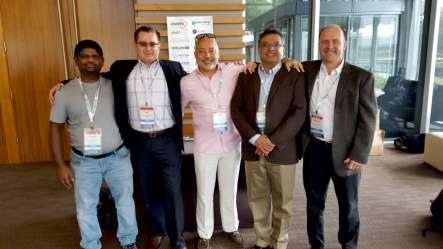
The next generation of computers may simulate or recognize smell, touch, and hand gestures, a revolutionary development. Technologies like web3, Industry 4.0, 5G, blockchain, and drones are not yet fully leveraged. One day, computers may interface or interact with our thoughts or our mind. Now we consider email, the internet, and mobile as simple dayto-day technologies but they changed not only our work but also our life in the last 20 years. Similarly, new technologies will continue to change our business and IT landscape.
At Hyper-Botz, we continue to train our employees on the latest technological innovations and their practical applications. I believe ideally we all need to have the world’s smartest people focused on solving the global problems we face, like climate change, food and water insecurity, infrastructure and transportation, and health and safety, rather than preoccupy themselves with finetuning algorithms to predict customer action or to recommend related products to them.
Where do you envision yourself to be in the long run, and what are your future goals for Hyper-Botz?
In long run, I would like myself and this company to contribute to solving global challenges in whatever capacity technology can. Our contribution could be as basic as using AI to be able to optimize the types and output of crops harvested per square foot of land or gallon of water. It could be about generating an optimal map of roadways and power lines across uneven terrain to connect remote parts of the world to the grid and
global marketplace. It could be about being better prepared for containing the next pandemic. I think we all need to think about leaving this world as a better place for the expected 10 trillion residents of this planet in the next few decades. My future goal will be to help educate people and support these long-lasting impactful missions in any way I can.
What would be your advice to budding entrepreneurs who aspire to venture into the IT Services & IT Consulting sector?
My advice to budding entrepreneurs would be always to consider exploring ways to help each other, your community, and the world. Center ethics at the core of your business operation and make decisions from there.
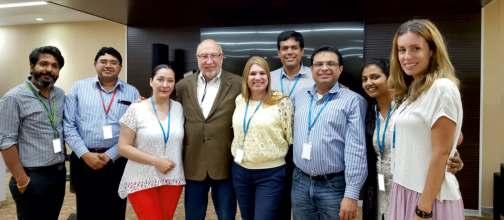
My advice to our young intelligent minds would be to continue to explore new ways of doing things and not be discouraged or distracted by old-school thinking or naysayers. Your passion and can-do attitude can only define what can be achieved. Surround yourself with equally intelligent and passionate people that bring a variety of skills and perspectives to the table, and your collective wisdom will take you to the next level.
A few years ago, space travel was seen only in science fiction movies and now is close to becoming a part of our everyday life. For the next generation, “the sky is the limit” is thinking too small – maybe “the galaxy is the limit” is more appropriate. More is possible now than has ever been possible before- you can achieve anything if you really want to!




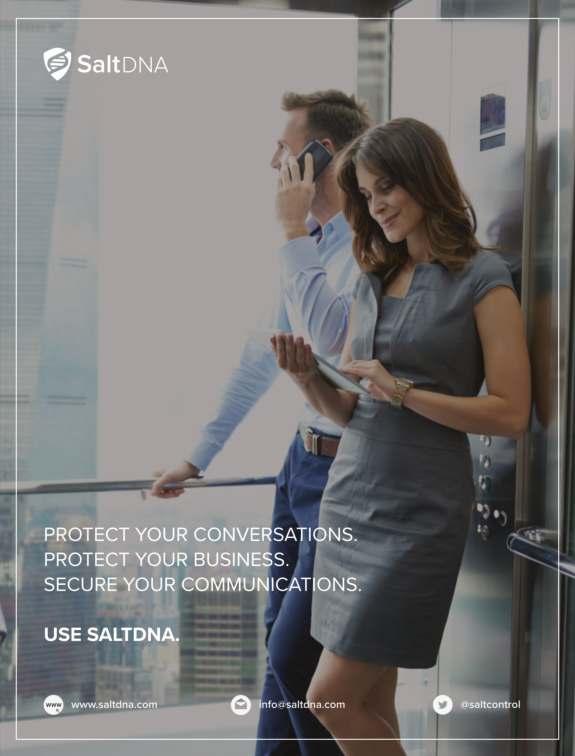
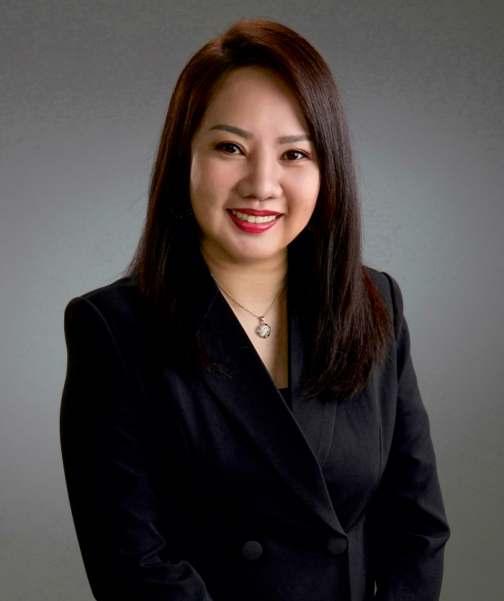
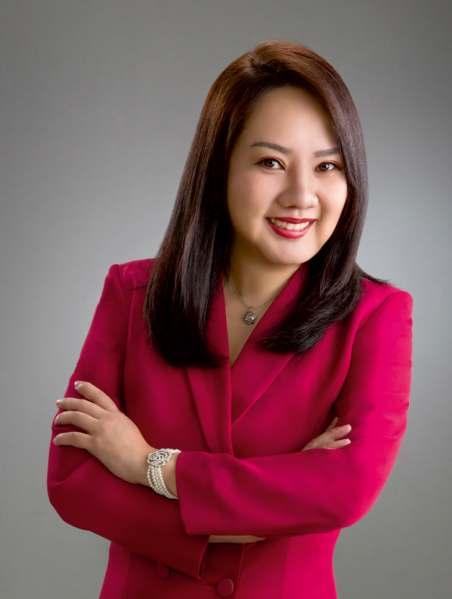

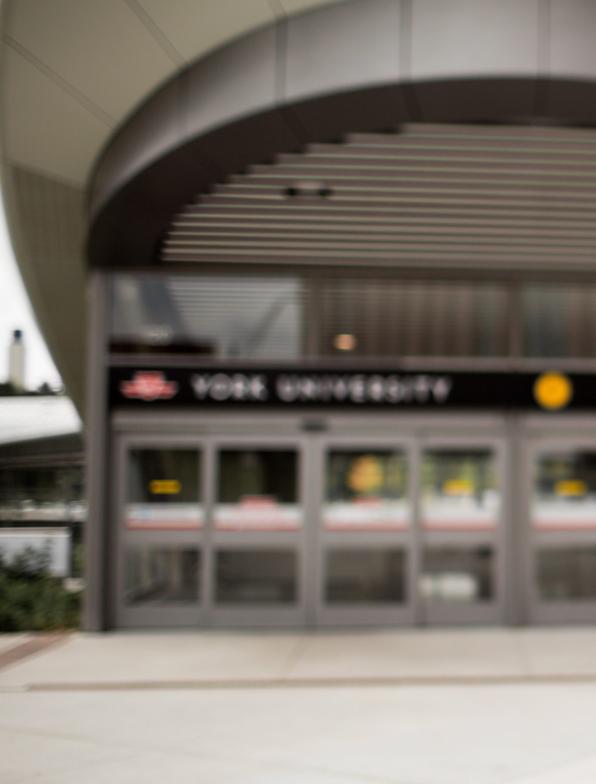
Technology has embarked humanity on a path of exponential growth, undisputed evolution, and progress. It continues to provide solutions to realms of human life and enhance its quality. However, adjourning innovations to bring constant reformations in technological developments becomes necessary when you need to tackle never-ending difficulties, especially when technology is actively assisting in abridging the typical obstacles.
At such time, we need trailblazers who take up the initiative that remodels the technological reformations in order to introduce ecological backup in daily advancements. Naeem Farooqi, Founder of FleetZero , is a reformer who leads a zero-emission mobility team that focuses on solving challenges and delivering roadmaps for fleet electrification. Naeem concentrates on creating a center of excellence in support asset management, economic analysis, as well as charging and fueling infrastructure for both electric and hydrogen vehicle adoption.
FleetZero is a global start-up in consulting and engineering across the fleet energy transition, helping to unlock solutions to some of the world’s most critical transportation decarbonization challenges.
Naeem has been in the transportation industry for a long time; through his expertise, he comprehends that overseeing ecological supervision is high time. In an interview with CIOLook , Naeem walked us through his journey along with the significance of FleetZero in the ever-evolving modern transportation sector.

Brief our audience about your journey as a business leader until your current position at FleetZero. What challenges have you had to overcome to reach where you are today?
I have been in the transportation industry for 15 years, starting as a statistics intern for the Canadian Urban Transit Association (CUTA). I was able to use this role to understand the transit industry, from which I transitioned to Metrolinx (a regional transit planning body). At Metrolinx, I took a deep dive into the supply chain and government procurement.
I assisted with joint procurements of buses and the first-ever vendor-managed inventory project, which won industry accolades. From there, I moved into senior-level roles in the private sector, which led me to consult.
Consulting is an opportunity to apply skills and capabilities across various projects. No two days are the same, and the work can take you to remote places. In my roles, I have faced challenges questioning whether I have the right education or experience. I have had clients question to ask why they should listen to me. I treat each interaction as an opportunity to grow as an individual and show others my true capabilities.
Enlighten us on how you have impacted the transportation sector through your expertise in the industry .
FleetZero is a global startup. Our goal is to be Future Ready by deploying solutions and offerings that advance sustainability across many sectors in transportation.
I have spent the last 15 years working in two primary fields of transportation. One is asset management, and the other is zero-emission mobility. Within asset management, I have helped governments and private organizations understand how to manage their vast transportation assets and use data to make complex
Our tool FleetShift has been developed using real-world data and a process of digital twinning of the asset. This offers our clients more accuracy in simulation results.

 Naeem Farooqi, Founder
Naeem Farooqi, Founder
decisions. I have developed complex Total Cost of Ownership models, which have improved bus lifecycle costs for various transit agencies.
I also have the privilege of being the instructor for the CUTA asset management course for the industry. In the area of Zero Emission Mobility, I have completed over 40 projects around the globe to help fleets transition toward alternative propulsion technologies. I helped bring the first electric bus to Lima, Peru and launch the first electric on-demand pilot in Saint John’s, New Brunswick (Canada).
Describe in detail the values and the work culture that drives FleetZero.
Our work culture is derived from our team approach to solving complex problems using data. We work as a collaborative unit to ensure high-quality delivery to clients. In the event of setbacks, we use challenging situations as an opportunity at an individual and team level. We lean into our fleet heritage and bring data into the mix.

Undeniably, technology is playing a significant role in almost every sector. How are you leveraging technological advancements to make your solutions resourceful?
We are using technology and digital twining to address the anxiety of range and power demand for electric fleet transitions. Our toolkit is made up of FleetShift and has been developed using real-world data and a process of digital twinning of the asset. This offers our
clients more accuracy in simulation results. This, in turn, provides greater confidence and flexibility in understanding the trade-offs of adding elements to electric fleets, such as USB chargers on buses and operating on extremely cold days.
What change would you like to bring to the transportation sector if given a chance?
I want to continue to expand the electric and hydrogen bus propulsion type for transit. I believe we have a significant global opportunity to reduce emissions from transportation, which roughly accounts for 25% of all GHG emissions. Expanding electric and hydrogen bus adoption would improve the quality of life for a large segment of the population around the globe. I have directly seen the impact of bringing electric buses to Lima, Peru, and other cities across the world. Moreover, I see myself continuing as a leader in the space and expanding our startup to new countries and markets globally.
What, according to you, could be the following significant change in the transportation sector? How is FleetZero preparing to be a part of that change?
Fixed route transit has evolved the mobility as a service opportunity, and on-demand transit gains greater user acceptance. Current technology platforms like Uber and Lyft have helped transit re-think how we move around our cities and towns.
This will be an excellent opportunity for mixing zeroemission mobility vehicles and new software solutions to usher in the next era of public transit.
What would be your advice to budding entrepreneurs who aspire to venture into the transportation sector?
Speak to individuals within the industry and use platforms like LinkedIn to see what current leaders in the field are doing. Early in my career, I would organize coffees with executives from companies I was interested in learning more about.
This allowed me to network and find job opportunities. Following COVID-19 lockdowns, I converted my networking approach to virtual coffees and have continued to build new relationships and gain insights from my peers on a global stage.
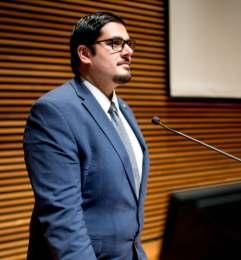

In today's modern industry, the use of technology
has been resulting in enhancing the working procedure in the traditional operational methods. The outcome of this development is the exponential progress that we observe in the diverse sectors of the industry.
The use of evolving technology like AR, VR and robotics has been redefining the ways people work. It is undoubtedly a matter of fact that technology has been assisting humans to go beyond the limits and enable innovations in distinct sectors. This has been a perpetual innovation that is simplifying things so far, and it is a result of the spark of the innovators who developed new ways to enhance traditional working methods and blend them with reliability.
And as a result, essential sectors like disaster management are embracing these technologies to improve emergency management. This is where Susumu Matsuda excels as a tech-inspiring stalwart who, with his awe-inspiring skillset and abstracted vision of pursuing "safety and security" for humans, established a VR business on his own. He devised a RiMM (Risk Management Method) that enables the development of VR applications in a brief period, and in 2012, he developed the essential software of the RiMM development tool.
Today under his visionary leadership, Santoku Corporation Co., Ltd . stimulates the essential intuition of human beings by concretely showing the dangers that exist in various workplaces by combining VR technology and mechatronics technology.
Let's indulge in Susumu's odyssey of perpetual advancements.
Susumu Matsuda majored in mechanical engineering at university and was researching feedback control theory and operational maneuver control of automobiles. After that, he studied the architecture of CPU at an electronics manufacturer and participated in the machine control of semiconductor manufacturing equipment and the development of vision processing functions.
th
However, after witnessing the 11of September 2001 terrorist attacks in the United States, he decided to move to his current company with the aim of pursuing "safety and security" for humans and the earth and launching a VR business on his own.
The initial purpose is to commercialize real-time interaction using VR. Real-time processing of 3D data requires high-performance graphics hardware. Therefore, initially, He focuses on the research field and provides services.
The need for the use of VR in the field of training emerged in 2007, and the development of accident response training simulators for the purpose of safe railway operation, security simulators for nuclear power plants, and decommissioning simulators for nuclear power plants. He continued to search for valid fields of VR application.
However, the development period and cost of the training simulator increase, and at the same time, the simple generation of derivative scenarios is required, which suffers from the development cost and mass production side. He specialized in accumulated safety and reassurance and aimed for efficient sensation generation through an intuitive operation.
He devised a RiMM (Risk Management Method) that enables the development of VR applications in a brief period, and in 2012 he developed the basic software of the RiMM development tool. According to market demand, Susumu aimed to develop a sensory reproduction that directly affects the psychological aspect through disaster experience. It was difficult to work on the psychological side with conventional VR methods alone.
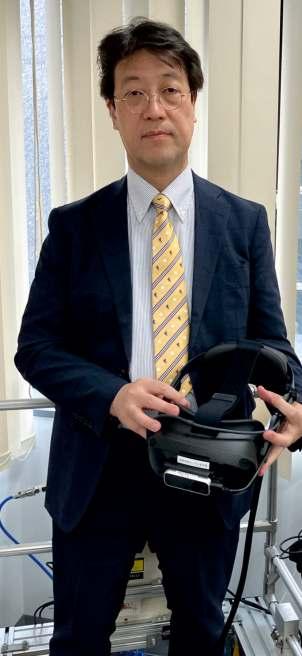
In 2014, he developed a robot control technology that regenerates the sensations felt by the body and repeats trial and error. He could see that the purpose can be achieved by combining VR with the newly developed tactile sense unit that can be felt by the body, the balance reproduction unit, and the skin sensation reproduction unit.
Susumu aims to provide safety and reassurance education tailored to the characteristics of each person.
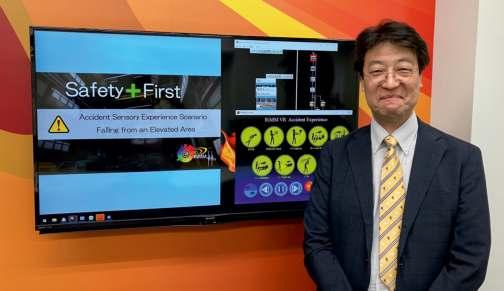
Continuing the evaluation revealed that there was a range in how people perceive things, and that the human sensitivity distribution was larger than expected. Using the prototype-evaluation-feedbackimprovement cycle (Which he called Cyclone's philosophy) devised in the development of the simulator, he focused on increasing the educational effect by expanding the scope of the application according to the characteristics of people and constructing and improving the scenario.
Prioritize the discovery of means to enhance safety and reassurance and focus on negative experiences. Scenarios used for experience (disaster database = 4 disasters: general, natural, labor, and human disasters) require many cases according to the recurrence situation and environment in order not to leave it as someone else's problem. Therefore, Susumu has been enhancing the system continuously since 2014 and has commercialized more than two hundred disaster scenarios corresponding to thirty-three occupations while preparing a standard package that can be experienced. Furthermore, from 2021, the market required the development of new means to maintain safety and reassurance. He focused on the biological characteristics of humans; he studied human experience processes based on biological science.
He developed and provided six products that enhanced safety at each stage according to the stage of the experience process derived from research. Based on these results, he announced the RiMM Safety and Reassurance Cyclone Philosophy in 2022, which will further improve safety by continuously implementing a program to strengthen safety and reassurance according to the biological characteristics of humans.
The RiMM Safety Reassurance Cyclone Philosophy is prepared with six enhancement programs that match the experience process. A training simulator that allows you to learn how to operate with your body, a disaster reenactment video that memorizes case studies of many disasters in Brain, a VR experience of disasters that increases your sensitivity to danger, and a VR that uses 360-degree panoramic images to find dangerous areas to encourage awareness, disasters.
It is a training simulator that promotes judgment and action by experiencing the disaster and a DIG simulator that guides disaster response through role-playing image simulation. He provides a system that efficiently maintains safety and reassurance based on the RiMM Safety and Reassurance Cyclone Philosophy. Susumu realizes safety and reassurance by fusing multiple engineering technologies and biological sciences to create means to support safety and reassurance.
With the concept of the cyclone, he challenged innovative technology and repeat trial and error to create composite fusion products. RiMM uses sensory reproduction technology that uses engineering such as VR, robot control, and posture detection, neurology, brain chemistry, and psychology to derive the biological characteristics of humans and directly touches the heart through VR experiences. increase sensitivity.
The emotional evaluation (subjective and objective) at the time of physical experience adjusts and experiences the stimulation of the five senses. Through this method, he aims to provide safety and reassurance education tailored to the characteristics of each person. Furthermore, these principles are based on the RiMM safety and reassurance cyclone philosophy derived from human characteristics.
He will continue to improve methods for enhancing resilience in the event of a disaster through training that links decision-making and initiative-taking actions while inducing motivation for safety and reassurance. While pursuing safety and reassurance, he also focuses on realizing a safe and reassurance society for humans and the earth.
There are several definitions of transformational
leadership, each more majestic than the previous. But in the simplest terms, we think of transformational leadership as a style of managing that inspires people and drives positive change in innovative and sometimes even profound ways.
Today, transformational leadership is prevalent in the world's most progressive companies. Management at these companies could have been content with their already enviable market positions. Instead, transformational leadership pushed them to excel in areas beyond their core businesses. At the helm were leaders who chose to identify new market opportunities and increase the sustainability of their market domination.
In her core business roles over the last number of years, Victoria Pelletier—Founding Director of Olive Ltd— has been a successful leader in leading teams and practices focused on creating purpose-driven organizations, positive workplace culture, and human-centred leadership to drive strong engagement, business transformation and strong stakeholder performance.
In fact, she is relentless and maniacal about not losing focus on culture and leadership as she transforms distinct businesses – this is the key differentiator to long-term organizational success.
CIOLook embraced the opportunity to interview Victoria, where she shared valuable facts highlighting her odyssey and professional tenure in the modern-day business arena.
Below are the excerpts from the exclusive interview: Victoria, brief our audience about your journey as a business leader up through your current position at Olive. What challenges have you had to overcome to reach where you are today?
I began my career, while attending university, in financial services, leading large-scale contact centre operations, and then was recruited to become the COO of a private Business Process Outsourcing (BPO) company at the age of 24.
My career since has been almost exclusively working for
I'm exploring new ways for technology to assist as an enabler to the solutions for the business challenges – recognizing that technology alone is not a silver bullet; I'm also focused on translating business challenges into multi-pronged solutions that include technology, process and people transformation.
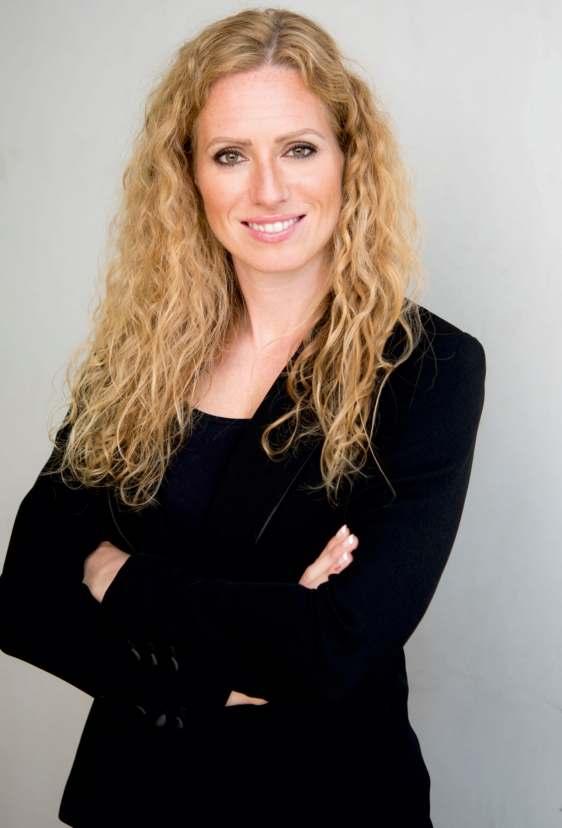
professional services organizations serving B2B clients with a focus on providing consulting and outsourced operations that are technology enabled. I have also worked for technology-first organizations like IBM, and I was also previously the CEO of a data and analytics company.
I've been heavily involved in technology throughout my career. I have chosen to invest time and money into many technology companies, including the FinTech company Olive LTD where I am a founding Board Director.
Tell us something more about Olive highlighting its mission and vision in the ever-evolving modern-day industry.

Olive is an open banking, payments-driven technology for businesses wanting to help customers reach financial goals by generating new deposits and donations inside of your existing customer experiences.
Enlighten us on how you have impacted the IT industry through your expertise in the niche.
Because I didn't study the field of technology and come with a business background of commercial and operational experience, I have been very focused on identifying client and business challenges. Moreover, I'm exploring new ways for technology to assist as an enabler to the solutions for the business challenges – recognizing that technology alone is not a silver bullet; I'm also focused on translating business challenges into multi-pronged solutions that include technology, process and people transformation.
I have also been heavily involved is creating greater diverse, equitable and inclusive workplaces and communities for those interested in the field of technology and have been fortunate to be recognized for this work with multiple awards and recognition.
What change would you like to bring to the IT industry if given a chance?
There are many opportunities to improve the technology industry that I want to continue to influence and advocate for – from responsible leadership in tech development –such as responsible AI, to utilizing human ingenuity and innovation to solve some of the world's most significant challenges – particularly around our environment and sustainability, to ensure that we are much more strategic and intentional in building more diverse technology talent deliberately and then continuing to invest in the
development of technology skills and digital fluency across the entire workforce.
Undeniably, technology is playing a significant role in almost every sector. How are you leveraging technological advancements to make your solutions resourceful?
No industry or group of companies can claim to be a technology company; in reality, EVERY company is a technology company. Whether core revenue comes from the sale of products and/or services, they are all technologically enabled – we live in a digital-first world where customers and employees expect a consumer-grade digitally enabled experience. Additionally, operational capability and excellence is inherently tied to its technology capability over overarching financial performance.
Where do you envision yourself to be in the long run, and what are your future goals?
I see myself continuing to operate in C-suite roles and on Boards where I will have the opportunity to work for purpose-driven organizations shaping strategy and delivering products, services and solutions that bring value to my clients and customers, while being hyper-focused on positive leadership and winning culture.
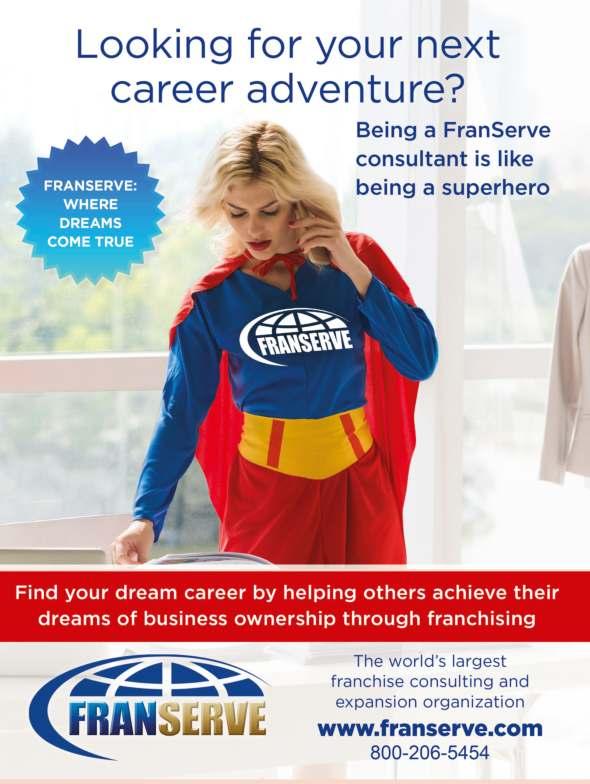
I am also a prolific public speaker – educating, motivating, and inspiring on topics such as resilience, DEI, leadership and culture – I see myself continuing to deliver these keynote talks to even more audiences.
What would be your advice to budding entrepreneurs who aspire to venture into the IT sector?
The advice that I would give to ANY entrepreneur, not just those in the IT sector, would be to follow their passion –building technology, products or services that are aligned to one's passion and not just one that meets a market need (which is, obviously, also very important) –entrepreneurship is hard and doing what you love and care about for what can be grueling hours is significantly easier when it's aligned to your own purpose and passion.

